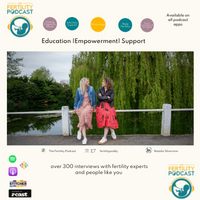Teaching whilst TTC
Welcome to episode 2 in our current series discussing the intricacies of fertility in the workplace. In this week’s episode, we’re joined by 4 teachers to find out just what it’s like to navigate a fertility journey whilst juggling the demands of a teaching job.
We welcome Caroline Biddle who worked as a secondary school drama teacher for 9 years. Caroline is no longer in a teaching role but is committed to changing the way fertility issues in teaching are managed and as a result, set up her organization – Fertility Issues in Teaching. Fertility issues in teaching Fertility Issues in Teaching are the first and only organisation to deliver specialist consultancy and training exclusively for schools to raise awareness around the impact on staff experiencing infertility and pregnancy loss and to support schools to recruit and retain the best staff by becoming inclusive, flexible, and equitable, as they move towards fertility-friendly workplaces. Claire Walker and Nic Jessop are both teachers currently working in education and Claire Stewart-Hall, who, like Caroline is no longer a teacher, is a coach who coaches people around race, adoption, and LGBTQ in the workplace.
Having to move schools
Caroline starts off by telling us about her experience of going through fertility treatment in the workplace and how She moved schools between treatment and experienced two very different styles of support. Neither school had a fertility policy in place which left her feeling both vulnerable and frustrated. In one school she had to explain every appointment for the headteacher to approve and this was far from satisfactory. It was then that she started researching fertility awareness in the workplace.
Getting your Union involved
Claire Walker explains her experiences of going through fertility treatment with her partner who was transitioning from female-male and how she was told by her employer that ‘IVF is elective like cosmetic surgery’ without any understanding of her individual circumstance. Claire explains how she has always been, as many teachers are, totally dedicated to her job and this comment felt her feeling undervalued.
Quitting your job
Claire Stewart-Hall shares with us a very harrowing experience where she experienced a missed miscarriage after being punched in the stomach by a pupil. Claire also talks about the difficulties of trying to conceive whilst juggling a busy role as a vice-principal and the taboos she felt being in a same-sex relationship and how ‘hidden’ she found fertility in general.
In stark contrast, Nic has a positive story to share about the support from her workplace during her recent successful IVF treatment and frozen embryo transfer, where she says her work environment was so supportive with her employers having a good understanding of what’s involved in infertility treatments and a leader who actively tries to understand what her employees are going through. Nic feels that her experience is an example that other schools should aim to follow.
On Caroline’s Instagram feed and her blog, she regularly talks about the need for schools to strive for compassion and thoughtfulness when discussing infertility. She shares examples with us where thoughtless comments have been made such as headteachers demanding that ‘scans are done on a Wednesday or at a specific time’. Leaders said that they ‘will offer paid leave for 1 treatment but not more, and even examples of where people have offered advice when they don’t have any understanding about fertility.
Claire Stewart-Hall is currently undertaking a doctorate on race and policy in schools and talks about how policy can be interpreted differently by individual schools, and that leaders will often ‘cherry pick’ what they want out of the policy or interpret the policy based on their own individual experience.
Kate talks about the fact that she sees many teachers struggling to conceive in her private practice and asks the group if they feel this is because stress is an issue within education or is it because teachers are natural learners and will seek out information and support? The group felt that long days and stress do impact and that as teachers are hyper-alert for long periods of time that the physiological impact on the body should not be underestimated.
SOCIALS:


